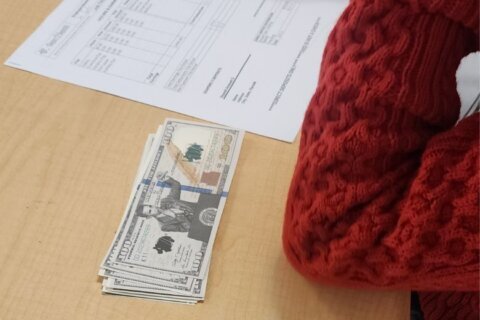Financial literacy courses are now required in 27 states, and studies have shown the benefits.
A report by the Financial Industry Regulatory Authority’s Investor Education Foundation said students who have taken personal finance courses in high school have better average credit scores and lower debt delinquency rates in early adulthood.
But the courses may still be missing the mark.
A recent survey by Junior Achievement of students who’ve completed financial literacy courses found many still struggled to correctly answer basic questions, like understanding what a credit score is, or what is considered a high-interest rate loan.
Many financial literacy curriculums developed for teens also focus only on the basics of personal finance, not necessarily real-world experiences.
“We need to go beyond just basic concepts and start to address practical applications,” said Monica Goldson, president and CEO of Junior Achievement of Greater Washington. “For example, integrating lessons on emotional spending, and talking about long-term financial planning and the psychological impact of having debt.”
Junior Achievement provides a personal finance curriculum for middle school students in Montgomery and Prince George’s Counties in Maryland and Fairfax County, Virginia, called JA Finance Park, which focuses on real-world, role-playing personal finances.
“Each student is assigned a persona that includes details like their career, salary, family situation and their credit score,” Goldson said. “They have to build and manage a personal budget and they have to make critical financial decisions like whether they are going to have a car, if they are going to rent or own a home, if they have children how to pay for child care.”
Goldson also believes learning about personal finance at an early age should begin at home. Teenagers are curious, and should children ask, for example, how much their parents make, or ask to see a parents’ paycheck. She said parents should agree, even if it seems awkward or inappropriate.
“Actually, I think it is helpful because when your child sees your pay stub that they also see is health care that comes out, taxes, they see social security and retirement account contributions,” she said. “That allows them to begin to ask questions, so I think it’s OK.”
Teens are also perceptive and know if their family is struggling financially. Letting children learn from their parent’s struggles or mistakes may also be a good lesson.
“What that credit looks like by having credit cards and not paying it, or paying only minimum amounts,” Goldson said. “All parents want better for their children, and in order to create that type of environment, you have to be honest. While it might not be the best place where you are right now, I’m sure kids are going to learn from it.”
The Junior Achievement survey of 1,000 13 to 18-year-olds conducted in February found that 42% of teens are “terrified” they won’t have enough money to cover their future needs and goals. But only 36% said they save part of any money they receive for their future.
Get breaking news and daily headlines delivered to your email inbox by signing up here.
© 2025 WTOP. All Rights Reserved. This website is not intended for users located within the European Economic Area.








